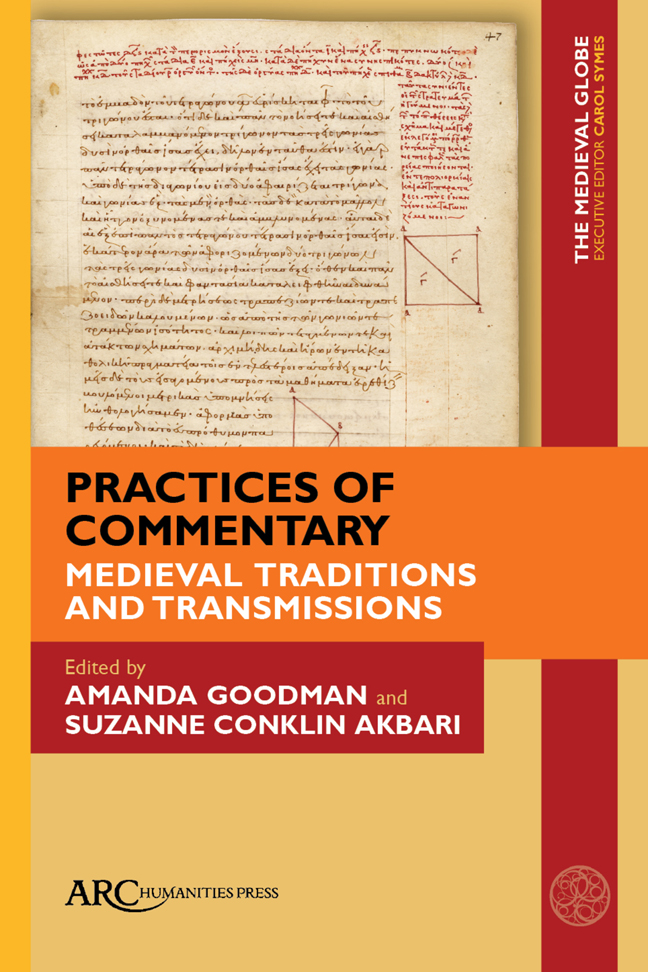Book contents
- Frontmatter
- Contents
- List of Illustrations
- Introduction: Commentary at the Crossroads
- Graeco-Roman Commentary Beyond Alexandria: Problems and Prospects
- From Plane to Space: The Narrative Arc of a Byzantine Mathematical Manual
- Periodization in the Sunni Qur'an Commentary Tradition: A Chronological History of a Genre
- On the Practice of Autocommentary in Sanskrit Sources
- Oral Commentaries and Scholarly Debates in Sanskrit Philosophy
- On the Nature of Chinese Buddhist Scriptural Exegesis: Observations on the Commentaries of Chengguan, Woncheuk, and Other Sui-Tang Exegetes
- The Mise-En-Page of a Sino-Tibetan Dunhuang Manuscript: Yuanhui's Commentary on the Laṅkāvatārasūtra
- Commentary and Multilingualism in the Ottoman Reception of Texts: Three Perspectives
- Index
Commentary and Multilingualism in the Ottoman Reception of Texts: Three Perspectives
Published online by Cambridge University Press: 17 February 2024
- Frontmatter
- Contents
- List of Illustrations
- Introduction: Commentary at the Crossroads
- Graeco-Roman Commentary Beyond Alexandria: Problems and Prospects
- From Plane to Space: The Narrative Arc of a Byzantine Mathematical Manual
- Periodization in the Sunni Qur'an Commentary Tradition: A Chronological History of a Genre
- On the Practice of Autocommentary in Sanskrit Sources
- Oral Commentaries and Scholarly Debates in Sanskrit Philosophy
- On the Nature of Chinese Buddhist Scriptural Exegesis: Observations on the Commentaries of Chengguan, Woncheuk, and Other Sui-Tang Exegetes
- The Mise-En-Page of a Sino-Tibetan Dunhuang Manuscript: Yuanhui's Commentary on the Laṅkāvatārasūtra
- Commentary and Multilingualism in the Ottoman Reception of Texts: Three Perspectives
- Index
Summary
Introduction by Jeannie Miller
As a scholar of medieval Arabic literature, I often find myself in a predicament. In the manuscript sources underpinning my research, I find comments, variants, shifts in chap-ter structure, and other scribal and scholarly interpretations. These accretions are often insightful and significant, and they sometimes relate in interesting ways to the history of modern scholarship. But as I go about constructing arguments and textual interpre-tations, wishing to integrate the insights of the tradition or provide a critical history of prevalent understandings, I am uncertain about how to contextualize this rich and vibrant early modern cultivation of medieval Arabic texts.
Throughout the nineteenth and most of the twentienth century, a “decline paradigm,” now widely critiqued, discouraged the study of Islamicate history and culture during the roughly five centuries between the Mongol conquest of Baghdad in 1258 and Napoleon's invasion of Egypt in 1798. This pall has dissipated in recent decades, leading to a burst of vibrant scholarship on early modern Islamic societies, and in the past few years we have seen increased scholarship on Ottoman Arabic literary production in particular. When it comes to the early modern Arabic language arts (philology and literature), the Maghreb and the majority Arabic-speaking provinces of the Ottoman empire have been the main focus of scholarship, though recently Arabic literary production and philology in majority Turkish-speaking territories and the Persianate Safavid and Mughal empires have received some limited attention. But Dana Sajdi's remarks about Ottoman intellec-tual history apply just as well to studies of Ottoman-era Arabic literature: scholars have “not sought to link these intellectual trends to those occurring at the imperial centre, probably because most modern scholars are proficient in either Arabic or Ottoman, but rarely in both.” The prolific and important body of Turkish-language scholarship is “not widely known internationally,” among Arabic literary scholars or Islamic Studies schol ars. National linguistic boundaries still often shape researchers’ perspectives, despite the widely acknowledged multilingual character of early modern Islamicate literary cul-ture, which worked among Arabic, Persian, and Turkish. When it comes to the Arabic language arts, the situation is complicated by an exaggerated interpretation of the Otto-man perception that Persian was a literary language, whereas Arabic was the language of the sciences, especially the religious sciences.
- Type
- Chapter
- Information
- Practices of CommentaryMedieval Traditions and Transmissions, pp. 171 - 194Publisher: Amsterdam University PressPrint publication year: 2023



